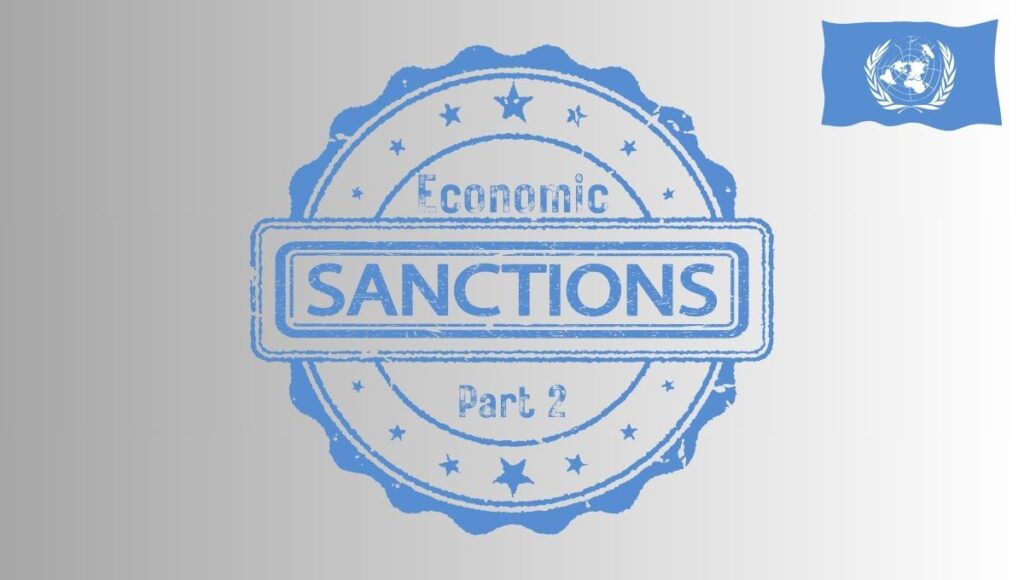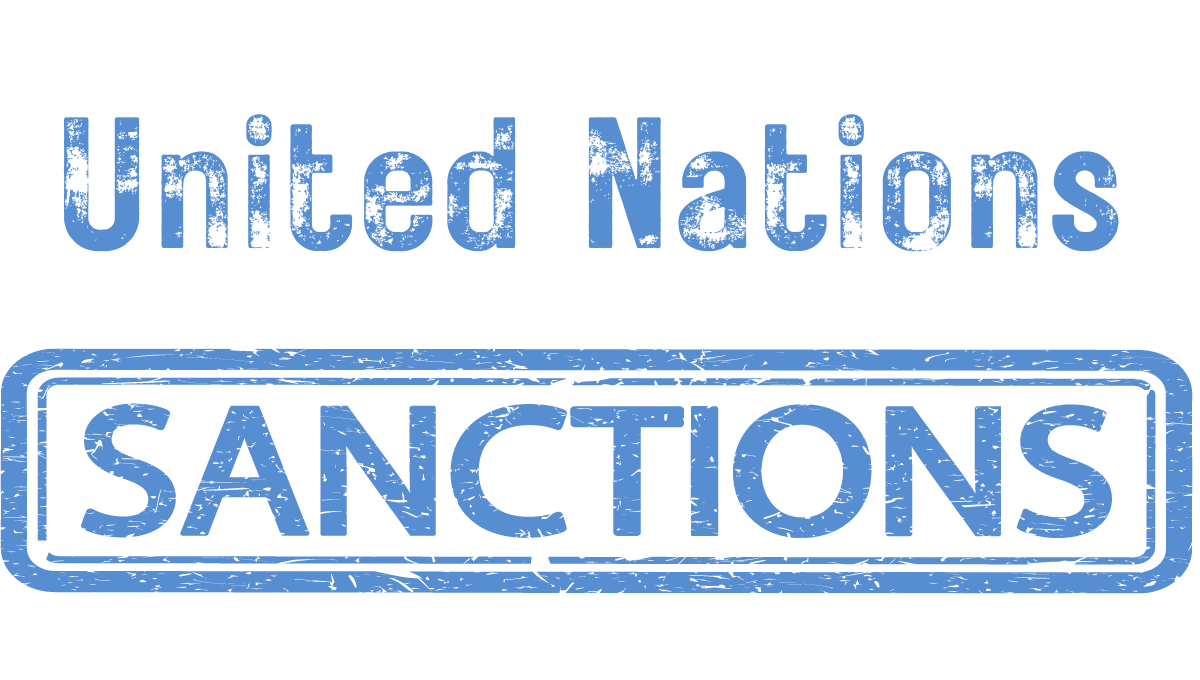Mar 7, 2024
Do You Know the Important Facts about United Nations Sanctions?
DiligenceResources

Economic sanctions are a diligence topic for all organizations. Are you familiar with the UN Sanctions and the impact on you?
Every country in existence is impacted by global economic sanctions. Either as a user of economic sanctions, as a target or as a “bystander” of sanction use by or against another country.
Economic sanctions are in the news – everywhere – because economic sanctions parallel ongoing global issues including, wars, corruption, criminality, and humanitarian rights. But sanctions aren’t only a news story. Economic sanctions are a foreign policy tool, an enforcement mechanism and even a global behavior modification strategy.
If you are not familiar with, or could use a short update on, the definition and some universal concepts that apply to economic sanctions take a look at Part 1 of the economic sanctions series.
Today, in Part 2 of the series, I will expand on the concepts around economic sanctions by focusing on the United Nations. The topics covered are:
- What do global economic sanctions mean for your diligence?
- How are global sanctions created ?
- How is the UN a part of the global sanctions system?
- Who has to follow UN sanctions?
- How are they applied?
- What are current UN sanction programs?
- Where do you find the “List”?
1. What do global economic sanctions mean for your diligence?
Global economic sanctions apply to a large numbers of individuals and entities in a wide variety of countries. Whatever your type of organization or entity, whatever your size, you need to undertake diligence to:
- know if your country has economic sanctions regulations
- understand if they apply to your organization or business
- conduct a review of your business to ascertain how these sanctions impact all aspects of operations
- create and implement a plan for compliance with these sanctions and if you decide the sanctions don’t impact you, properly record that diligence.
- perform ongoing monitoring of both the regulations and your business for compliance
A few general words of caution – don’t assume that:
- sanctions will not have any impact on your organization or how your operate your business – you don’t know if you don’t look
- size exempts you from sanctions
- outsourcing means you don’t have any responsibility for sanction compliance
- sanctions don’t apply to, or impact your dealings with customers, patrons, suppliers, trading partners, consultants, business partners and other entities
- you can operate your business, profit or not profit, online in a global, digital world and have no sanction compliance obligations
The only way you will know what applies to you, your organization, your business and your activities is to perform diligence. And yes, if you don’t know what to do, you may need to hire someone who is a sanctions expert. An individual or firm that is knowledgeable about your industry and impact of the laws and regulations of your country and wherever you do business.
2. How are Global Sanctions Created?
Global sanctions are multilateral sanctions, meaning common sanctions are imposed by a group of countries against a common target.
For multilateral sanctions to be created and succeed there needs to be a level of consensus among the creators (countries) of the sanctions regarding: (i) the need for the sanction, (ii) the target, (iii) the type of sanction, (iv) the monitoring and enforcement methods, both with respect to the target as well as those that are required to comply with the sanction. To do all of this there has to be an infrastructure to assume the administrative and ongoing processes and procedures such as monitoring, reporting, and modification of the sanctions.

3. How is the UN a part of the global sanction system?
The current process for imposing multilateral global sanctions is through the authority of the United Nations, a multilateral organization founded in 1945. The current membership is 193 states (as in nation states). Upon joining the UN each state commits to following the UN Charter.
The UN Charter gives the UN Security Council the right to impose economic sanctions, this is the wording of Article 41 of the UN Charter:
Article 41
The Security Council may decide what measures not involving the use of armed force are to be employed to give effect to its decisions, and it may call upon the Members of the United Nations to apply such measures. These may include complete or partial interruption of economic relations and of rail, sea, air, postal, telegraphic, radio, and other means of communication, and the severance of diplomatic relations.
4. Who has to follow the UN Sanctions?
The answer is – every member state. Each member state agreed to adhere to the UN Charter as a condition of membership. The UN charter provides the Security Council with the right to “call upon the Members of the United Nations to apply such measures.” If the Security Council imposes economic sanctions the members are compelled to apply them.
5. How are they applied?
The UN does not implement UN sanctions on a country basis. The Security Council calls on the UN members to “apply” the sanctions. This means that the work needed to implement the UN sanctions falls to each member through the use of their own legal and regulatory systems.
Practically, each member has to take the UN sanctions and:
- Make them law in their own country through their own various legal systems
- Issue regulations/legal requirements/guidance for their own country
- Monitor compliance based on the laws that they have implemented for their own country
- Enforce these sanction laws
- Impose consequences for non compliance
- Create an administrative framework to:
- supervise, regulate and manage their country sanction programs
- provide the UN with ongoing information and reporting as required or requested
- Establish a process for adding, modifying and removing sanctions programs as directed by their commitment to their own legal sanction regime and the UN sanctions.
An example of member state application of the UN sanctions is demonstrated by this chart on the United States Department of the Treasury – Office of Foreign Asset Control (OFAC) site. The chart shows the direct correlation between the various UN sanction resolutions and the coordinating US legal implementation of the UN sanction.
Theoretically, this information should exist for each UN member state. I note that this is “theoretical” because it is not a given that all UN sanctions have been implemented by each member state. For example, there are UN sanctions against UN members and those countries are not imposing sanctions against themselves.
The various UN sanction committees track member implementation of each sanction program.
An important concept to understand – the UN does not have the power to enact or change member countries laws or to enforce sanctions within a particular country. The UN Sanction power relies upon the cooperation and willingness of the member states to adhere to their commitments as to the UN as an organization and to each other as members of a multinational global endeavor.
6. What are current UN sanction programs?
The UN Security Council imposes various levels of financial, trade and travel restrictions and bans to:
- promote peace
- deter terrorism and human rights violations
- address non constitutional changes
- foster nonproliferation
As of today there are 15 sanction regimes. To access information about each sanction regime and links to the committees that support them, go to this page on the United Nations website. At the top of the page there is a horizontal menu. Choose “Sanctions” to see a drop down menu that includes links to the committees that administer the sanctions. there are also links to information about how to be delisted from a sanction list and past sanction regimes. The UN also issues fact sheets about the various sanction programs.
The 2023 fact sheet is available online.
7. Where do you find the Lists?
Each sanction committee maintains a sanction list that applies to a particular sanction However, The UN also offers an online consolidated list of all individuals and entities subject to UN sanctions. The United Nations Security Council Consolidated List is located at: https://www.un.org/securitycouncil/content/un-sc-consolidated-list
This list:
- can be searched using multiple languages on this input form on this page
- is available in multiple formats for download
- is updated from time to time
- there is an ability to request a Mailing List Subscription. The instructions are on the bottom of this page. According to these instructions you need to send an email.
The Big Picture
The United Nations Sanction do not exist in a vacuum. If I were to diagram the sanctions, for each Security Council sanction resolution the UN would be in the center and the states that implemented the resolution would be branches or spokes off the center. Theoretically, there would be 193 branches for each resolution. However, member countries would not be the only branches.
In addition, to the legal framework that each members state has enacted, the other branches would be international organizations that are part of, or “invested” in UN Sanction programs. For example:
- Interpol issues special notices for all of the individuals and entities on the UN Consolidated List. These notices alert all law enforcement to the fact that an entity or individual is subject to a UN sanction. Law enforcement then acts accordingly based on the legal framework in their country.
- International Red Cross operates on the intersection between humanitarian aid and the UN sanctions. the adoption of UN Resolution 2664 which allows for an exemption to asset freezes for humanitarian aid is an example.
Finally, I caution you that the UN sanctions are dynamic. New sanctions programs are added, lists change, program terms adjust, entities and individuals are delisted and programs are terminated. All this is a reminder that diligence relating to sanctions must also be dynamic. This is not once and done diligence, instead this is an ongoing diligence responsibility. Compliance programs relating to sanctions must build in the diligence needed to stay compliant.
Sign Up to Receive the Diligence File Emails – More Ideas & Resources to Advance Your Diligence
Thank you


Subscribe for Diligence Updates
Get the latest updates, resources, offers, and more.
"*" indicates required fields
The Diligence File respects your privacy. Privacy Policy